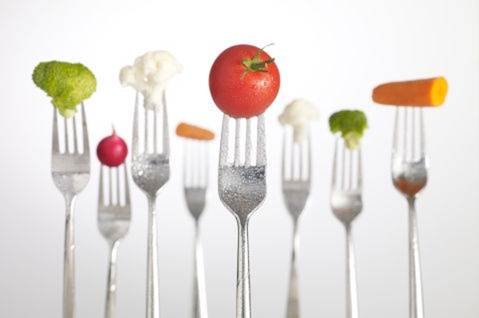First it’s one kilo, then two. Slowly but
surely, the weight creeps on. It’s too easy to gain weight but it doesn’t have
to be hard to take it off, insists US diet guru Keri Gans, author of “The Small
Change Diet: 10 Steps to a Thinner, Healthier You” (available form Amazon).
While she admits that “people fail some point because they’re trying to master
a number of lifestyle and diet changes all at once”, it doesn’t have to be that
way.
According to Gant, you can ditch your bad
eating behaviors in favor of healthier ones by trying out one new habit at a
time. Start with one’s small change for a week. Once it becomes a habit, add
another. “If you can take your time, tackle one and then another and see
success along the way, you’re more likely to keep up the momentum and keep it
up for a lifetime.”
Small change #1: Eat every four or five hours
If you’re a regular meal skipper, you
probably have a million excuses – maybe you’re not hungry in the morning or
you’re too busy for lunch. “If you skip meals,” says Gans, “you will be
hungrier the next time you eat – and you will overeat.”
Solutions for you:
·
Even if you’re not a breakfast person, ensure you eat
something within two hours of waking, whether it’s non-fat yoghurt topped with
nuts, a piece of fruit, or high-fibre cereal packed in a plastic container and
consumed at your desk.
·
Too busy at work to eat lunch, so you snack? “It’s hard
to get all of the right nutrients that will fuel your body and keep you feeling
full when you are constantly munching,” says Gans. Rather, pack a lunch
featuring low-fat protein like chicken, turkey or hard-boiled eggs and
high-fibre carbohydrates like quinoa, whole meal bread and bulgur. If you can’t
eat it all at once, have part of it no later than five hours after breakfast,
to create both satiety and energy throughout the afternoon.
·
If you don’t have the energy to cook when you get home,
have a late afternoon nibble on whole meal crisp bread with low-fat cottage
cheese, 10 to 12 almonds or a small bag of soy crisps, and enjoy dinner a
little later in the evening.

Small change #2: Makeover your plate
You may love your meal and potatoes, but
it’s all about proportion, says Gans. “A plate built around meal and starch is
out of balance and plate after unbalanced plate leads to extra kilos around
your waist and hips.”
Solutions for you:
·
Fill half your plate with green, leafy vegetables,
beans or any other non-starchy vegetable. A quarter of the plate should be
high-fibre carbohydrates like wholegrain pasta or brown rice, while the rest
should be lean protein, such as lamb, beef, skinless chicken, beans, fish,
eggs, pork tenderloin or tofu.
·
Start lunch and dinner with a salad. If you’re pressed
for time, chop enough vegetables for two or three days of salads in advance,
pre-package them and store them in the refrigerator “to go”. “If you’re
starving when you get home from work, prepare your salad, eat it and then cook
the rest of your meal.”

Small change #3: Think before you drink
Unless you’re sipping water, beverages are
a minefield of hidden kilojoules through sweeteners not labeled as sugar, such
as fructose, dextrose and sucrose. Read the label – chances are the kilojoules
per serving are for a portion of the container, not the whole thing.
Solution for you:
·
Have a large glass of water before meals. According to
study by Virginia Polytechnic Institute and State University in the US,
postmenopausal women who drank 375ml of water before eating consumed 250kJ less
than those who didn’t – a saving of 91,690kJ or 2.7kg a year.
·
Drink 30ml of water for every 125kJ you consume. “That
means if you’re a smaller or sedentary woman who consumes 5860kJ a day, you
need to consume 1.5L of fluid.”
